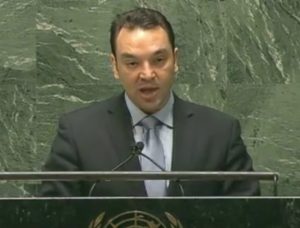By Rafael Medoff
Jewish leaders are strongly criticizing Rutgers University for employing a longtime Syrian government official to teach in its political science department.
Dr. Mazen Adi, who served in the Syrian Foreign Ministry and with the Syrian delegation to the United Nations from 1998-2014, is scheduled to teach a course in “International Criminal Law and Anti-Corruption” in the Rutgers graduate program in political science in the spring 2018 semester.
Adi, who holds a doctorate in law from the University of Rome-Tor Vergata, first taught at Rutgers in 2015, but his continued employment there is attracting fresh attention amid the Assad regime’s ongoing perpetration of war crimes. Despite the professor’s track record and associations, the university describes the issue as a matter of “academic freedom.”
In his speeches at UN events and other international conferences, Adi has vigorously defended Syrian dictator Bashar Assad as a peacemaker and reformer, despite the Assad regime’s war crimes.
Adi is also known for his extreme anti-Israel positions, including his accusation in 2012 that “international gangs led by some Israeli officials are now trafficking children’s organs.”
Keith Krivitzky, CEO of the Jewish Federation in the Heart of New Jersey — which serves Monmouth and Middlesex counties, the latter where Rutgers’s main campus is located — told JNS, “For an institution of higher learning, which is supposed to foster critical discussion and engagement with human values, [hiring Adi] is a perverse — and dumb — move.
“Giving him a platform and legitimizing a perspective which much of the civilized world has deemed horrific is hard to defend.”
Human rights groups estimate that the Assad regime is responsible for more than 300,000 deaths since the start of the Syrian Civil War in 2011, including thousands of civilians who were targeted with nerve gas and other chemical weapons.
Some five million Syrians have fled the country, and another six to seven million have been displaced within the country.
The hiring of Adi “is irresponsible, and, in my opinion, shows a real lack of judgment,” Mark Levenson, chairman of the state’s New Jersey-Israel Commission, said. “I would certainly want to know who made this regrettable decision.”
When JNS asked Prof. Richard Lau, chairman of the Rutgers political science department, whether he was the one who made the decision to hire Adi, Lau deferred to university spokesman Neal Buccino, who declined to identify which university personnel were involved in the hiring process.
Buccino told JNS that Adi was retained “because of his expertise in international law and diplomacy, and other fields.”
Regarding Adi’s views and track record, Buccino said, “Rutgers faculty members enjoy the same freedoms of speech and expression as any other individual in this country. Rutgers will not defend the content of every opinion expressed by every member of our academic community, but the university will defend their rights to academic freedom and to speak freely.”
Stephen Flatow, past chairman of the Community Relations Council of the Jewish Federation of Greater MetroWest in northeastern New Jersey, said it is “disingenuous” for Rutgers to portray the controversy as a free speech issue.
“Nobody is denying Mazen Adi’s right to free speech,” Flatow told JNS. “There are plenty of websites, op-ed pages, and institutions that will give him a platform. But Rutgers is a public university, so the question is whether New Jersey taxpayers should provide him with a salary to indoctrinate Rutgers students with his pro-Assad and anti-Israel propaganda.”
The fact that “International Criminal Law and Anti-Corruption” is the course Adi will teach “shocks the conscience,” Levenson said.
Flatow called it “incredible that a longtime representative of a regime which is deeply corrupt and is guilty of war crimes will teach a course on corruption and criminal law.”
Jewish leaders are also troubled by the fact that Adi’s faculty page, on the Rutgers website, describes him as “a career diplomat,” without mentioning the regime he represented for so many years. Levenson said the description is “disingenuous . . . While technically true, it misleads to the wrong conclusion.”
Adi did not respond to requests for comment from JNS.
One of Rutgers’ most well-known alumni, UCLA computer science professor Dr. Judea Pearl, called the hiring of Adi “bewildering and amateurish, lacking all common sense.”
“A person who defends the Assad regime, and accuses Israel of trafficking in human organs, is not qualified to teach in a kindergarten,” Pearl said in an interview with JNS.
Pearl, a prominent human rights activist, is the father of late Wall Street Journal reporter Daniel Pearl, who was kidnapped and murdered by Islamic terrorists in Pakistan in 2002.
“I’ve had some interaction with Syrians who serve under Assad and speak for him — their moral fiber is so twisted that I wouldn’t trust them in any transaction,” said the professor, “much less teaching a course at a university.”

















